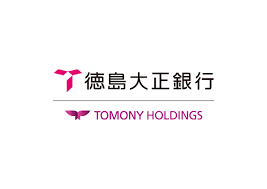On July 29, 2024, Tokushima Taisho Bank (headquartered in Tokushima City) held a seminar on ocean-going shipping at its training center in Tokushima City. The seminar gathered 32 participants from 15 companies with ties to Tokushima Taisho Bank, including those with ship financing contracts.
Yu Yamada, Assistant Director at RightShip (headquartered in Australia), addressed shipowners transitioning from coastal to international shipping. Yamada emphasized, “The goal of RightShip is to be utilized across the entire maritime industry and contribute to achieving zero incidents.”
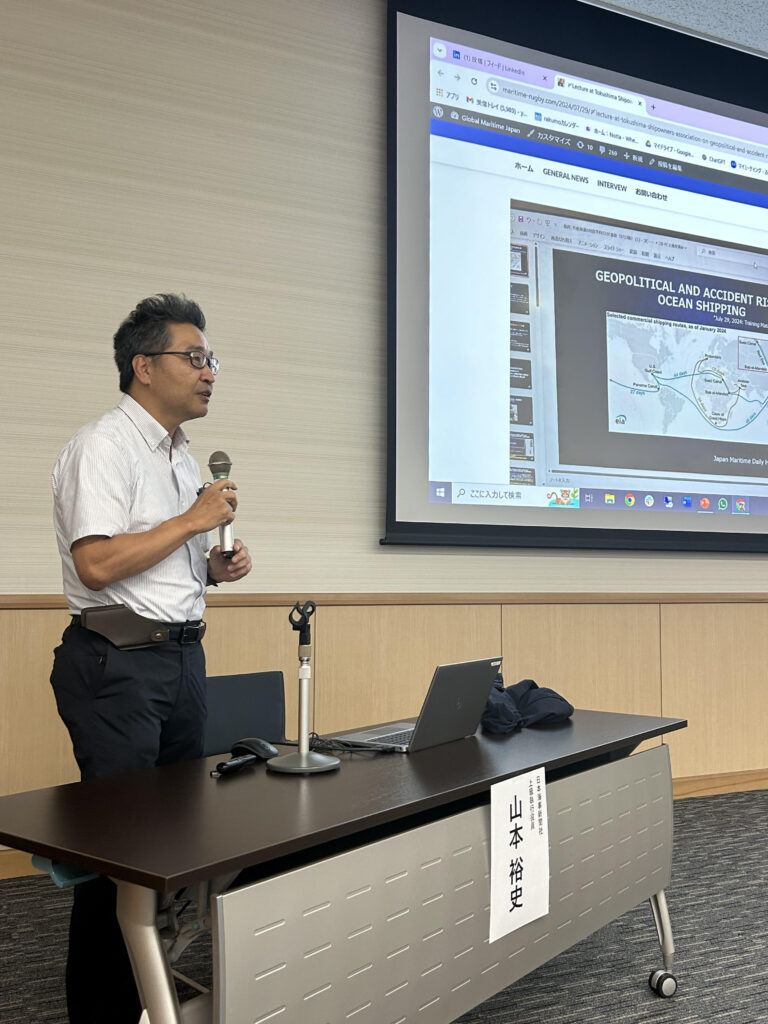
Hirofumi Yamamoto, Senior Executive Officer from Japan Maritime Daily, and Chief Editor, highlighted the importance of understanding the distinct roles and responses of operators and shipowners during maritime accidents. He stated, “It is crucial to consider in advance how both parties will respond and what their roles will be in the event of an accident.”
The seminar featured presentations by Yu Yamada on “The Relationship between International Shipping and RightShip” and by Hirofumi Yamamoto on “Geopolitical Risks and Accident Risks in International Shipping.”
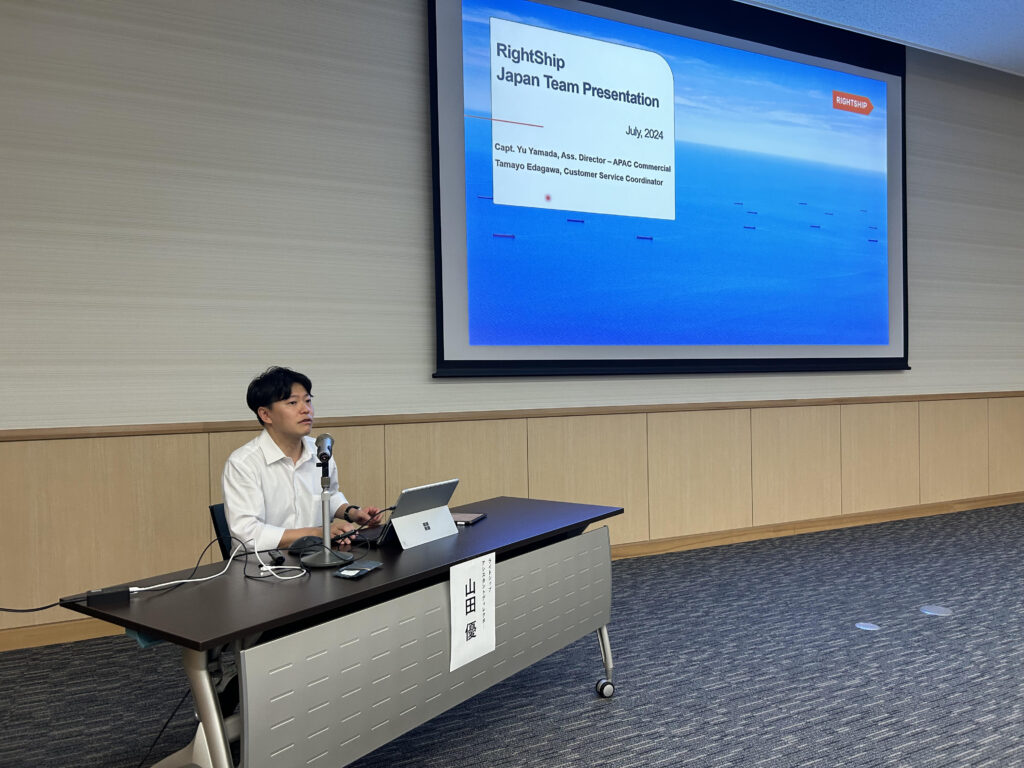
Explanation of the Scoring System
Yu Yamada from RightShip began by providing an overview of RightShip. “Traditionally, RightShip has been associated with the elimination of substandard vessels, partly due to its establishment by major Australian resource companies. However, in 2020, the organization underwent significant changes in its structure and policies,” Yamada clarified, highlighting the differences from its previous role.
One of the key functions of RightShip is the “Safety Score System.” Yamada explained, “This system automatically calculates a benchmark in five stages for cargo ships and companies managing even a single vessel. The scores are based on the performance in ‘Port State Control’ (PSC) inspections and accident records.”
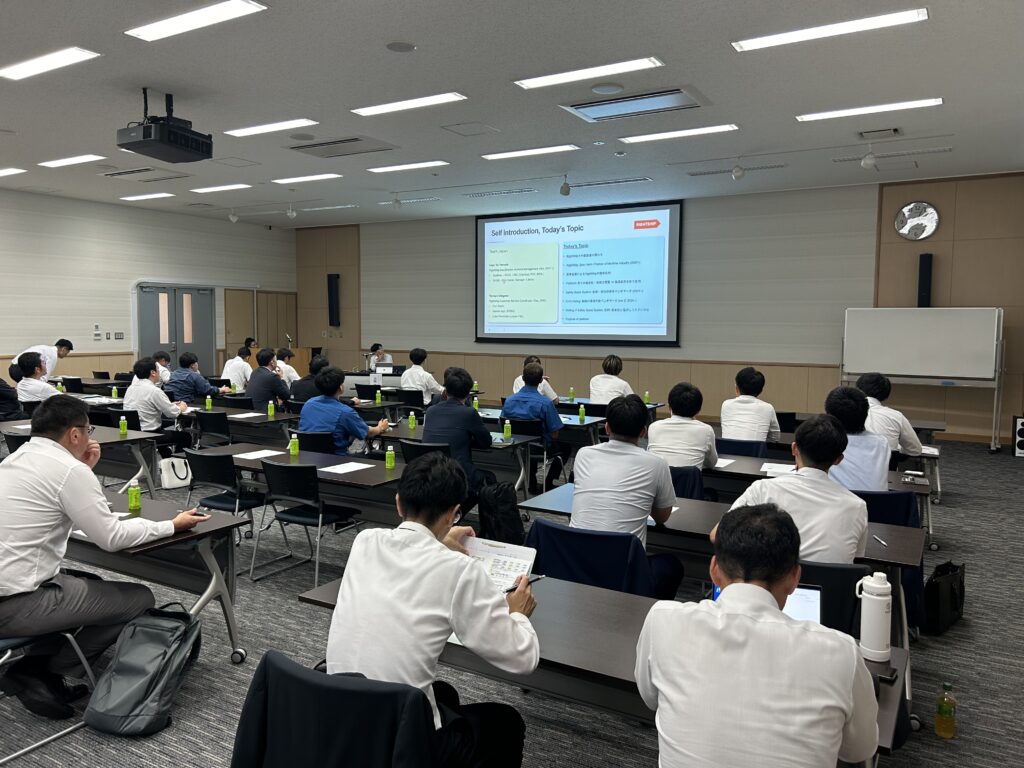
“For example, if an accident or trouble occurs, but its severity and frequency are lower compared to other ships or management companies, the score will tend to improve. Similarly, if a ship receives fewer defect or deficiency notices during PSC inspections than the historical average for that port, the score will not decrease and may even improve,” he elaborated.
For shipowners, a low RightShip score can have serious operational consequences, such as exclusion from certain operations and restrictions on port entries. This led to several questions from shipowners, such as “How can we recover our RightShip score?” and “Should we contract with RightShip?”
In response, Yamada stated, “Even if a management company’s score drops due to an incident, undergoing another RightShip inspection will not affect the score. The system strictly adheres to automatic calculations based on PSC and accident records, ensuring a highly transparent platform free from arbitrary decisions.”
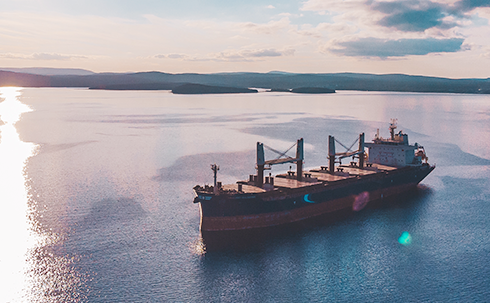
Yamada also pointed out, “Generally speaking, Japanese shipowners tend to have poorer accident report writing skills compared to their international counterparts. Improving this aspect is crucial.”
■Explanation of the Scoring System
Yu Yamada from RightShip began by providing an overview of RightShip. “Traditionally, RightShip has been associated with the elimination of substandard vessels, partly due to its establishment by major Australian resource companies. However, in 2020, the organization underwent significant changes in its structure and policies,” Yamada clarified, highlighting the differences from its previous role.
One of the key functions of RightShip is the “Safety Score System.” Yamada explained, “This system automatically calculates a benchmark in five stages for cargo ships and companies managing even a single vessel. The scores are based on the performance in ‘Port State Control’ (PSC) inspections and accident records.”
“For example, if an accident or trouble occurs, but its severity and frequency are lower compared to other ships or management companies, the score will tend to improve. Similarly, if a ship receives fewer defect or deficiency notices during PSC inspections than the historical average for that port, the score will not decrease and may even improve,” he elaborated.
For shipowners, a low RightShip score can have serious operational consequences, such as exclusion from certain operations and restrictions on port entries. This led to several questions from shipowners, such as “How can we recover our RightShip score?” and “Should we contract with RightShip?”
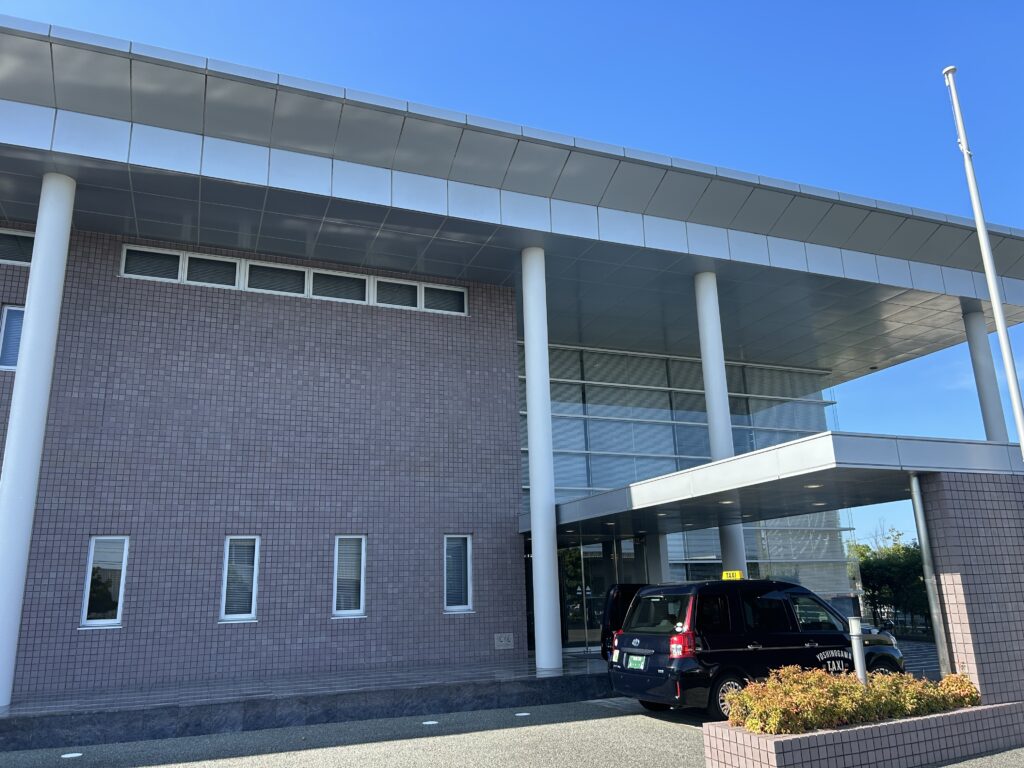
In response, Yamada stated, “Even if a management company’s score drops due to an incident, undergoing another RightShip inspection will not affect the score. The system strictly adheres to automatic calculations based on PSC and accident records, ensuring a highly transparent platform free from arbitrary decisions.”
Yamada also pointed out, “Generally speaking, Japanese shipowners tend to have poorer accident report writing skills compared to their international counterparts. Improving this aspect is crucial.”
■BBC Risks
In the following presentation, Hirofumi Yamamoto drew upon his nearly 30 years of experience as a maritime journalist, having attended numerous press conferences on maritime accidents. He specifically discussed the roles played by operators, shipowners, and ship management companies in complex chartering relationships, which are often difficult for the general public to understand. He referred to incidents such as the “GALAXY LEADER” capture (November 2023), the “WAKASHIO” grounding (August 2020), the “Ever Given” grounding in the Suez Canal (March 2021), and the “DALI” collision with the Francis Scott Key Bridge (March 2024).
Yamamoto explained the differences between “legal responsibility” and “social responsibility,” noting that perspectives on maritime accidents and press conferences vary greatly between Japan and other countries. He stressed that shipowners must always keep accident risks in mind as vessel owners.
He also spoke about the risks associated with BBC (bareboat charter) shipowners. In a BBC, the shipowner owns only the vessel, while the ship’s management is handled by the operator under contract. Although the operational responsibility generally lies with the operator, making it seem as if there is no risk for the shipowner, Yamamoto highlighted risks such as the deterioration of collateral value due to poor maintenance at the time of redelivery and the risk of dispatching to sanctioned areas.
Regarding regional banks, he emphasized the importance of not only evaluating operators based on quantitative aspects like financial statements but also conducting qualitative assessments by visiting the headquarters of overseas operators, similar to the visits made to shipowners. This includes understanding the mindset of international shipowners and the atmosphere of their offices.
Among shipowners in Tokushima, only a few operate international vessels. Tokushima Taisho Bank plans to support these shipowners as they transition from BBC ships to time-charter ships and venture into international shipping.
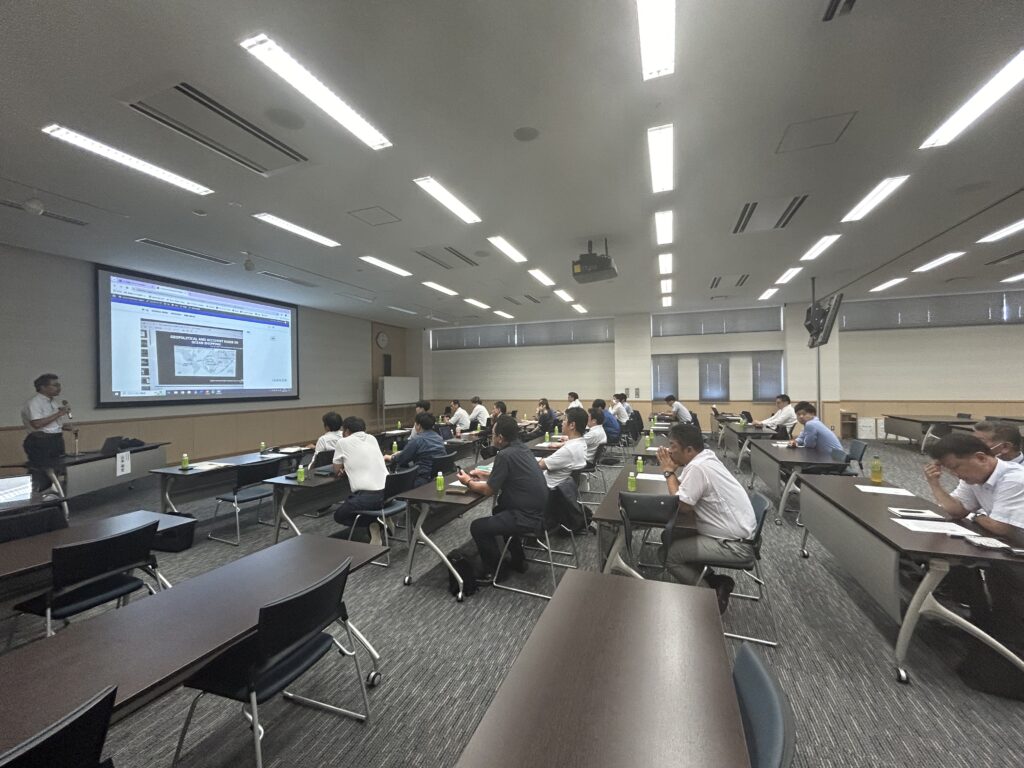
〆徳島大正銀行は徳島船主を集め外航船勉強会を開催した。
徳島大正銀行(本店・徳島市)は2024年7月29日、徳島市内の同行研修会館で外航船勉強会を開催した。徳島大正銀行と船舶融資契約を結ぶなどの関係のある15社・32人が集まった。ライトシップ(RightShip, headquarters Australia)
の山田優(Yu Yamada)アシスタントディレクターは内航船から外航船に進出する船主に対し次のように説明した。「ライトシップの目的は海事産業全体に使用してもらい、災害ゼロに貢献することである」。日本海事新聞の山本裕史(Hirofumi Yamamoto)、上級執行役員主筆(, Senior Executive Officer)は次のように説明した。
「海難事故が発生した際、オペレーター(運航船社)と船主の立場の違いが鮮明になる。普段から事故発生時の際に両者の対応や役割について検討しておくことが重要である」
講演内容はライトシップの山田氏が「外航海運とライトシップの関係」。山本氏が「外航海運の地政学リスクと事故リスクについて」というテーマでそれぞれ講演した。
